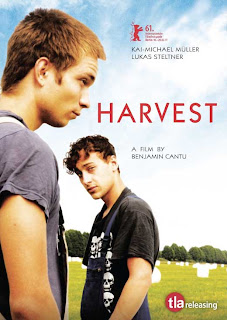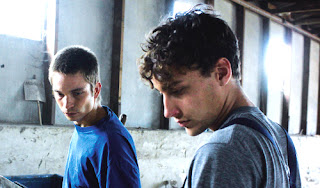I need to say from the outset that I normally like slow-burning indie dramas.
In fact, it’s the greater bulk of the movies I see. I like to watch them because they take the time to craft a rich and fulfilling narrative, and create fully-formed characters that you care about, quite deeply usually, by the end of the movie. They’re very satisfying films to watch.
I thought this movie was one of them. On the surface, Harvest (Stadt Land Fluss), the first film I chose to see in this year’s Mardi Gras Film Festival, looks every bit the part. Long slow sweeping landscape shots. A slow build of character introductions, chief among them withdrawn Marko who has an abusive past with an alcoholic mother, and so is not inclined to let anyone near to him at all. He is guardedly friendly with the other apprentices on the farm where he has a bright future but that’s about it. You are introduced to the other people on the farm through naturalistic, almost documentary-like scenes which on one level work quite well.
And yet unfortunately for all the natural light, scenes of work on the farm (cows, lots of cows!), and slow reveals of the various people Marko interacts with, what you end up with is a movie that takes a good long while to get nowhere very special.
Yes, Marko’s closed-off world is slowly prised open by the warm and friendly Jakob who with great care takes the time to get to know Marko properly.
Sensing Marko’s reticence to get too close to anyone, Jakob moves closer to him step by step until a bond, no matter how tentative is formed. In that respect, it is a sweet, touching movie, and you hope that the two of them will be able to create something special from this awkward, one step forward, two steps back dance of attraction.
The pity is that in trying to reflect the two men’s slow steady walk towards each other, the director Benjamin Cantu crafts a movie so slow moving that it almost stops. What should be a delightful natural waltz to true love becomes achingly dirge-like. It never truly takes shape nor finds a sense of itself and the budding romance between these two obviously decent, caring guys gets lost in the fog of nothing much happening at all.
Some reviewers have welcomes this as a positive, citing the fact that it lends the gently unfolding story of their relationship a bucolic country idyll in which it can take place. That is true to some extent, and the steady rhythm of life on the land with its early starts, and deadlines that pay no heed to normal work hours or leisure time does provide the perfect backdrop for the pace and tenor of the budding relationship.
While I can acknowledge the director’s intent in this regard, the movie becomes a prisoner to this relaxed approach. The mood and tone has effectively robbed the life from what should have been a beautifully unfolding relationship between two lost souls seeking someone, and somewhere to belong (this longing for a place to call home is evinced by their talks about where they’d drive to, Poland or Belin, and whether life on the farm is where they want to be).
Yes, Marko and Jakob do connect, and yes it is sweet and touching but it is so understated as to be muted to the point of invisibility. Even their big night out in the city, where they finally express their true feelings is underplayed to the point where you never see any real emotions come into play. There might be sex, there might only be kissing, who really knows? The director has clearly tried to imply what happened but does it with such understatement that, in the end, I couldn’t even be bothered filling in the blanks. It’s a pity because the characters of Marko and Jakob were appealing, but both they, and the relationship they eventually form after many stops and starts suffers from a blandness that drains all the life from it, and you stop caring.
The film too lacked a visual bite. Shot in what was clearly intended to be natural light, you are struggling much of the time, save for the obvious night scenes, to work out when events are taking place. You’re helped out at times by conversation about what an early morning start it is, or what a bought day it’s been but those conversational clues are few and far between. Unfortunately the poor lighting also makes it hard to see characters at all sometimes such as when Marko is talking to the “mother” of the farm, Mrs Burchadt, who is filmed against a brightly lit window. It was so poorly lit that I could barely make out her face most of the time, and is distracted me from what was a fairly pivotal scene establishing with admittedly clunky exposition how wounded and damaged Marko is, and why.
There was no real drama either. It was obvious that Marko, with no real family, or other career prospects needed this job. In his final year, his continued employment pivoted solely on passing the last big exam, which he was clearly struggling with, either due to literacy issues, or general mac of will. And yet it was clear it was his home so he should be fighting to stay. Instead, we got one half-hearted fight with Mrs Burchardt, from which Marko storms out, and then magically he passes the exam and all is well.
It underlines the central problem in what could have been a great movie if handled properly. It relies too much on the quiet rhythms of the countryside to inform the tone of the movie to the point where all the colour, drama and emotional richness is sadly leached away. By the end of the film, all you want to do is leave Marko and Jakob to their embrace, which finishes the movie rather abruptly, and get back to the messy rushed pace of reality, vowing you will never endure the turgid routine of life at the farm ever again. Which, of course, is the opposite of what normally happens when any of us go to see the movie, and the polar opposite of what Benjamin Cantu would have wanted with his first, but flawed, directorial effort.


